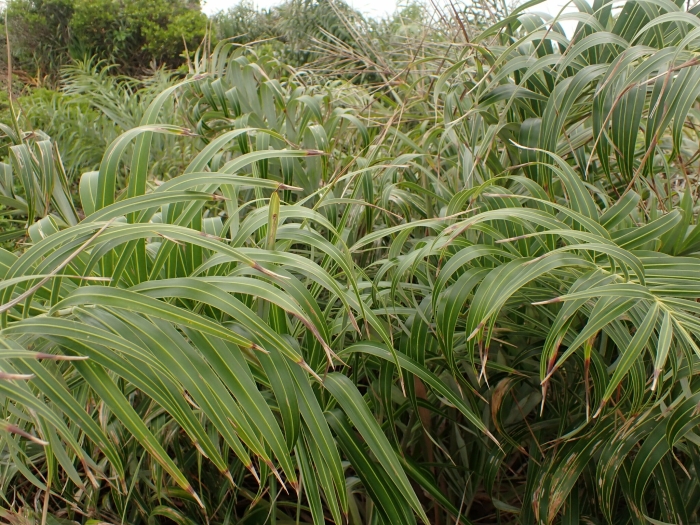Seashore Palm
(Allagoptera arenaria)
Seashore Palm (Allagoptera arenaria)
/
/

agujaceratops
CC BY 4.0
Image By:
agujaceratops
Recorded By:
Copyright:
CC BY 4.0
Copyright Notice:
Photo by: agujaceratops | License Type: CC BY 4.0 | License URL: http://creativecommons.org/licenses/by/4.0/ | Rights Holder: agujaceratops | Publisher: iNaturalist | Date Created: 2023-11-30T08:33:54-08:00 |





















Estimated Native Range
Summary
Allagoptera arenaria, commonly known as Seashore Palm, is a perennial palm tree native to the sandy coastal areas and restingas of Brazil. It is adapted to growing just above the high tide mark in coastal strand habitats, where it plays a role in stabilizing sand dunes and providing habitat for local wildlife. This palm typically reaches about 6 feet in height and has a clumping growth form with multiple stems. The bright green to silvery-green pinnately compound leaves can grow up to 6 feet long, creating a dense and bushy appearance. The Seashore Palm produces yellowish-green fruits that resemble small coconuts and are about 1 inch long, which become edible upon ripening.
The Seashore Palm is valued for its drought tolerance and ability to thrive in sandy, well-drained soils, making it an excellent choice for coastal and beachfront landscaping. It is often used in urban settings, gardens, and as a container plant due to its moderate size and ornamental foliage. The leaves are traditionally used for making baskets and other woven crafts, while the fruits are consumed fresh or processed into drinks and jams. This palm prefers full sunlight but can tolerate some shade and requires moderate watering, especially in well-drained soils. It is generally free of serious pests and diseases, but root rot can occur if overwatered or planted in poorly drained soils.CC BY-SA 4.0
The Seashore Palm is valued for its drought tolerance and ability to thrive in sandy, well-drained soils, making it an excellent choice for coastal and beachfront landscaping. It is often used in urban settings, gardens, and as a container plant due to its moderate size and ornamental foliage. The leaves are traditionally used for making baskets and other woven crafts, while the fruits are consumed fresh or processed into drinks and jams. This palm prefers full sunlight but can tolerate some shade and requires moderate watering, especially in well-drained soils. It is generally free of serious pests and diseases, but root rot can occur if overwatered or planted in poorly drained soils.CC BY-SA 4.0
Plant Description
- Plant Type: Tree
- Height: 4-6 feet
- Width: 4-15 feet
- Growth Rate: Slow
- Flower Color: Yellow
- Flowering Season: Summer
- Leaf Retention: Evergreen
Growth Requirements
- Sun: Full Sun, Part Shade
- Water: Medium
- Drainage: Fast, Medium
Common Uses
Drought Tolerant, Low Maintenance, Salt Tolerant
Natural Habitat
Native to the sandy coastal areas and restingas of Brazil, where it stabilizes sand dunes and provides habitat for wildlife
Other Names
Common Names: Restinga Palm , Sand Palm
Scientific Names: Allagoptera arenaria , Allagoptera pumila , Allogoptera arenaria , Cocos arenaria , Diplothemium arenarium , Diplothemium littorale , Diplothemium maritimum
GBIF Accepted Name: